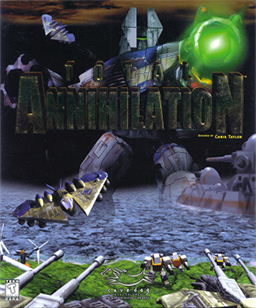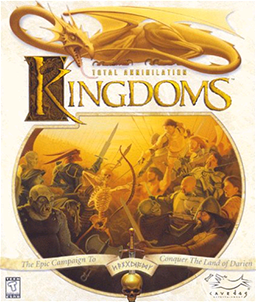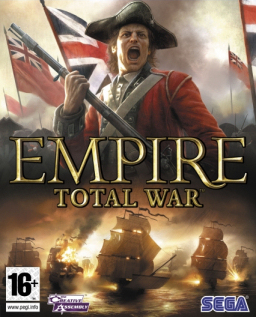
StarCraft is a real-time strategy video game developed and published by Blizzard Entertainment for Microsoft Windows. The first installment of the video game series of the same name, it was released in 1998. A Classic Mac OS version was released in 1999, and a Nintendo 64 port co-developed with Mass Media and published by Nintendo was released in 2000.
Real-time strategy (RTS) is a subgenre of strategy video games that does not progress incrementally in turns, but allow all players to play simultaneously, in "real time." By contrast, in turn-based strategy (TBS) games, players take turns to play. The term "real-time strategy" was coined by Brett Sperry to market Dune II in the early 1990s.

Total Annihilation is a science fiction real-time strategy video game released in September 1997 for Microsoft Windows and Mac OS by Cavedog Entertainment and distributed internationally by GT Interactive. Two expansion packs were released in 1998, The Core Contingency on April 29 and Battle Tactics on July 20, while a medieval-themed spin-off called Total Annihilation: Kingdoms was released on June 25, 1999.

Cavedog Entertainment was a PC game developer and publisher based in Bothell, Washington. Founded in 1995 as a division of edutainment game developer Humongous Entertainment, Cavedog was known for the 1997 release of Total Annihilation—which won several accolades, such as multiple Game of the Year honors—considered one of the "greatest games of all time" in 2004 by GameSpot.

Total Annihilation: Kingdoms, or shortened to Kingdoms, is a fantasy real-time strategy video game released on June 25, 1999, as a spin-off of Total Annihilation, and was the last title developed by Cavedog Entertainment. A tie-in book titled The Chronicles of Darien contained the storyline, rules, units, and other details. An expansion pack, The Iron Plague, was released in 2000.

Ground Control is a real-time tactics video game developed by Massive Entertainment and published by Sierra Studios, released for Microsoft Windows in 2000. The game focuses on a conflict between two factions vying for control of a planet and a series of alien artefacts contained on its surface, in which players take the role of an officer for each faction, working to achieve their objectives through using a variety of futuristic style of troops, engaging different tactics that make use of their units, the terrain and careful planning.

StarCraft: Brood War is the expansion pack for the military science fiction real-time strategy video game StarCraft. Released in December 1998 for Microsoft Windows and June 1999 for Mac OS, it was co-developed by Saffire and Blizzard Entertainment. The expansion pack introduces new campaigns, map tilesets, music, extra units for each race, and upgrade advancements. The campaigns continue the story from where the original StarCraft ended, with the sequel, StarCraft II: Wings of Liberty, continuing from the conclusion of Brood War. The expansion was released first in the United States on December 18, 1998.

Shogun: Total War is a turn-based strategy and real-time tactics video game developed by The Creative Assembly and published by Electronic Arts for Microsoft Windows personal computers. Released in June 2000, the game became the debut title in The Creative Assembly's Total War series. Set in Japan during Sengoku jidai—the "Warring States" period from the 15th to the beginning of the 17th century—the game has players adopt the leader of a contemporary Japanese clan, attempt to conquer the nation and claim the position of shōgun. The turn-based aspect of the game focuses on a map of Japan where military force, religion, diplomacy, espionage and economics all influence the player's actions, whilst battles are fought in a 3D real-time mode.
Warlords is a video game series created by Steve Fawkner, in which role-playing elements are combined with turn-based strategy in a fantasy setting. The series began with Warlords in 1990 and includes three other games, two expansion packs, and several spinoffs.
Micromanagement in gaming is the handling of detailed gameplay elements by the player. It appears in a wide range of games and genres, including strategy video games, construction and management simulations, and pet-raising simulations. Micromanagement has been perceived in different ways by game designers and players for many years: some perceive it as a useful addition to games that adds options and technique to the gameplay, something that is necessary if the game is to support top-level competitions; some enjoy opportunities to use tactical skill in strategic games; others regard it as an unwelcome distraction from higher levels of strategic thinking and dislike having to do a lot of detailed work. Some developers attempt to minimize micromanagement in a game's interface for this reason.

The Spring Engine is a game engine for real-time strategy (RTS) video games. The game engine is free and open-source software, subject to the terms of the GNU General Public License v2.0 or later.
Real-time tactics (RTT) is a subgenre of tactical wargames played in real-time, simulating the considerations and circumstances of operational warfare and military tactics. It is differentiated from real-time strategy gameplay by the absence of classic resource micromanagement and base or unit building, and by the greater importance of individual units and a focus on complex battlefield tactics.

Warhammer 40,000: Dawn of War – Dark Crusade is the second expansion to the real-time strategy video game Warhammer 40,000: Dawn of War developed by Relic Entertainment and published by THQ. Based on Games Workshop's tabletop wargame, Warhammer 40,000, Dark Crusade was released on October 9, 2006. The expansion features two new races, the Tau Empire and the Necrons. Including the Imperial Guard from Dawn of War's first expansion pack Winter Assault, a total of seven playable races in this expansion.

Band of Bugs is a turn-based tactics video game developed by NinjaBee. The game includes a level editor, leaderboards, Xbox Live Vision camera support, and multiplayer gameplay. It was released for the Xbox 360 via Xbox Live Arcade on June 20, 2007.

Tom Clancy's EndWar is a strategy video game available on Microsoft Windows and all seventh-generation platforms except the Wii, with the timing and flow of gameplay differing across platforms. The console and PC version is a real-time tactics game designed by Ubisoft Shanghai, while the handheld versions feature turn-based tactics. It was released on Nintendo DS, PlayStation 3, PlayStation Portable, and Xbox 360 in November 2008. A Windows version was released in February 2009.

Empire: Total War is a turn-based strategy and real-time tactics video game developed by Creative Assembly and published by Sega. The fifth installment in the Total War series, the game was released in 2009. The game, which focuses on the early modern period of the 18th century, was announced at the Leipzig Games Convention in August 2007. The macOS version of the game was released by Feral Interactive on 10 June 2014. The Linux version was released, also by Feral Interactive, on 8 December 2014.
Strategy is a major video game genre that emphasizes thinking and planning over direct instant action in order to achieve victory. Although many types of video games can contain strategic elements, as a genre, strategy games are most commonly defined as those with a primary focus on high-level strategy, logistics and resource management. They are also usually divided into two main sub-categories: turn-based and real-time, but there are also many strategy cross/sub-genres that feature additional elements such as tactics, diplomacy, economics and exploration.
Downloadable content (DLC) is additional content created for an already released video game, distributed through the Internet by the game's publisher. It can either be added for no extra cost or it can be a form of video game monetization, enabling the publisher to gain additional revenue from a title after it has been purchased, often using some type of microtransaction system.

Napoleon: Total War is a turn-based strategy and real-time tactics video game developed by Creative Assembly and published by Sega for the Microsoft Windows and macOS. Napoleon was released in North America on 23 February 2010, and in Europe on 26 February. The game is the sixth stand-alone installment in the Total War series. The game is set in Europe, North Africa, and the Middle East during the French Revolutionary Wars and Napoleonic Wars. Players assume the role of Napoleon Bonaparte, or one of his major rivals, on a turn-based campaign map and engage in the subsequent battles in real-time. As with its predecessor, Empire: Total War, which included a special United States storyline, Napoleon features three special campaigns that follow the general's career.













